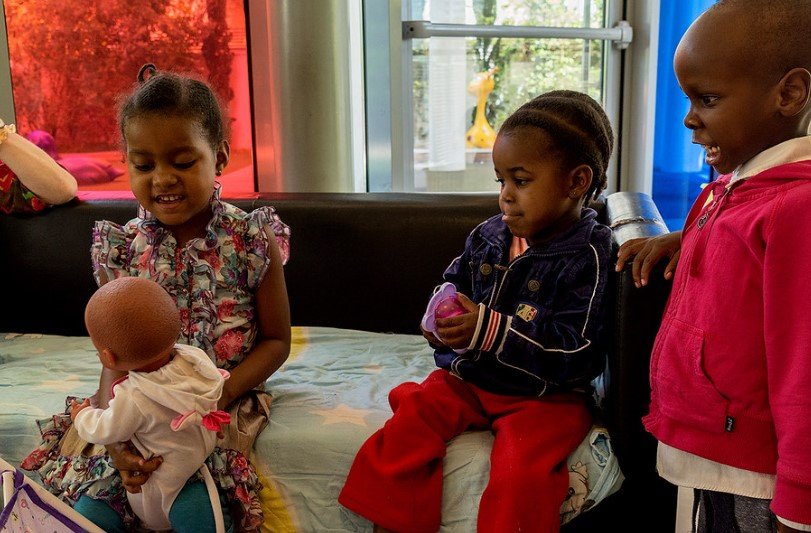A bond that began with diplomacy has grown into a web of deep economic, humanitarian, and scientific ties. From children’s hospitals to cybersecurity labs, this partnership is turning ideas into action.
For all the high-stakes diplomacy and defense deals, the most life-changing part of the U.S.-Israel relationship isn’t happening in embassies or war rooms. It’s happening in operating rooms, research parks, greenhouses, and classrooms—where collaboration means survival, growth, and something very close to hope.
It’s also what gives the U.S.-Israel Business Initiative, launched by the U.S. Chamber of Commerce and its Israeli counterpart, a distinctly human pulse. While it drives investments and fuels startups, at its core it’s about turning invention into impact.
A Business Initiative With a Beating Heart
What started as an economic bridge has grown into something far more potent. The U.S.-Israel Business Initiative didn’t just build trade ties. It built ecosystems.
Today, it supports thousands of entrepreneurs, engineers, and medics working across four sectors: health, energy, agriculture, and cybersecurity. These aren’t isolated projects, either. American venture capital is fueling Israeli startups, while U.S. tech giants like Google, Microsoft, and Intel run R&D labs in Tel Aviv and Haifa.

One of the clearest examples of this spirit is the support flowing to Save a Child’s Heart (SACH). Based in Holon, Israel, the nonprofit performs lifesaving cardiac surgery for children from countries where such care is unavailable. Many of its patients come from Africa, the Palestinian Territories, Iraq—and some even arrive with U.S. support.
SACH’s work isn’t political. It’s personal. The team has saved over 6,000 children to date.
Health Tech That Crosses Borders
The health sector is where U.S.-Israel collaboration gets especially intimate. Think wearables, remote diagnostics, and predictive AI—technology born in joint research hubs that doesn’t just cure diseases, but catches them early.
Some startups started by ex-IDF medics now work with American universities like Johns Hopkins and Stanford. Others supply telemedicine platforms that U.S. hospitals quietly adopted during the COVID-19 crisis.
And it’s not one-way traffic.
Israeli hospitals now integrate American biotech and software tools, especially in neonatal care and oncology. A good example? Zebra Medical Vision. Their AI-powered imaging platform, backed by U.S. investors, is already reading scans for early signs of breast cancer and cardiovascular disease.
One paragraph here with just one sentence.
Lives are being saved in real time.
Cyber Ties in a World on Edge
Cybersecurity isn’t just a buzzword in this partnership—it’s the core of national survival for both countries. And they’ve been in sync for years.
The U.S. Department of Homeland Security and Israel’s National Cyber Directorate run joint drills. Israeli cyber units—some spun off from elite military service—often plug right into Silicon Valley networks.
Here’s where it gets concrete:
-
Microsoft’s Israeli R&D center contributed to Defender, its flagship enterprise security product
-
U.S. banks rely on Israeli anti-fraud systems
-
Several Israeli startups use U.S. government grants to build zero-trust architecture tools
And when Iranian hackers target American utilities or Israeli ports, intel often flows both ways within minutes.
There’s a shared understanding here: the threats are global, but the defense is personal.
Agriculture Meets Artificial Intelligence
Desert farming sounds like something out of a sci-fi movie. In Israel, it’s daily life.
With very little arable land and water, Israeli farmers have pioneered drip irrigation, soil sensors, and AI-based weather prediction. Those tools are now making their way to California almond growers and Texas cotton fields, thanks to U.S.-Israel pilot programs.
Take Netafim, for example. It’s an Israeli company, but its tech is now deployed in dozens of U.S. states, backed by USDA grants and U.S. distribution partners.
Here’s how some key agricultural collaborations look on paper:
| Project Name | Focus Area | U.S. Partner Institution | Israeli Counterpart |
|---|---|---|---|
| AgriScan | Pest prediction AI | University of Illinois | Hebrew University |
| AquaYield Integration | Water optimization | USDA Smart Farming Program | Netafim |
| Desert Foods Research | Vertical farming | MIT Agro Lab | Volcani Institute |
This kind of work isn’t flashy, but it’s feeding people. That matters more than headlines.
Children, Not Politics
Back in Holon, where Save a Child’s Heart is headquartered, you’ll see something that seems impossible in the current Middle East climate.
An Iraqi child holding the hand of an Israeli nurse. A Tanzanian mother smiling beside a Jewish volunteer. An American surgeon briefing a Palestinian translator before a risky procedure.
One paragraph, one sentence.
It’s fragile, and it’s real.
Over 50% of SACH’s patients come from regions with no diplomatic ties to Israel. Many surgeries are funded by donations from U.S. families and supported by American hospitals that provide training and post-op care.
This is where all the policy talk fades. What’s left are actual children, healed by a partnership that most people never see.
Investment With an Eye on Humanity
The numbers behind the U.S.-Israel Business Initiative tell a compelling story:
-
$60 billion in bilateral trade last year alone
-
Over 500 joint R&D ventures since 2020
-
Tens of thousands of jobs supported in both countries
But the real value? It’s in the ripple effects.
A cybersecurity tool launched in Herzliya now defends a public school system in Ohio. A surgical technique perfected in Tel Aviv saves a newborn in New Orleans. A drought-resilient crop bred in Be’er Sheva helps a Navajo Nation farmer feed his village.
That’s not just collaboration. That’s human innovation, with purpose baked in.
